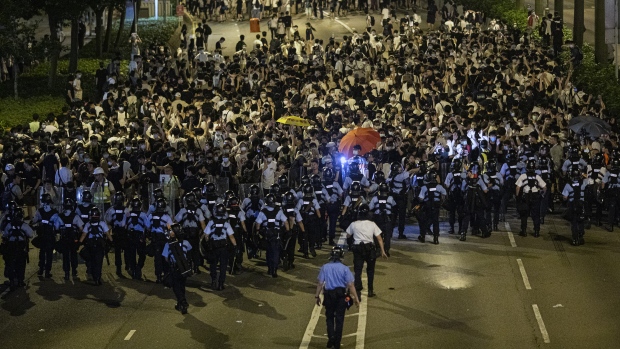Jun 10, 2019
China faces showdown in Hong Kong as mass protests roar back
, Bloomberg News

China has spent much of the past five years tightening its grip over Hong Kong with little challenge. Now, hundreds of thousands in the city are fighting back.
Hong Kong is bracing for a potentially historic showdown over extradition legislation that could for the first time subject residents to face justice in Chinese courts, further eroding the city’s autonomy. Opponents on Sunday staged one of the largest protests since the former British colony’s return to China: Organizers said more than one million participants showed up, while police put the figure at 240,000.
Tensions are only heating up, with demonstrators vowing to surround the city’s Legislative Council on Wednesday, when lawmakers debate scores of proposed amendments. Hong Kong’s Beijing-backed leader, Carrie Lam, defended the bill in a 45-minute news briefing Monday, saying it was necessary to prevent the city from becoming a “haven” for fugitives and vowing to press ahead with its passage. China endorsed her government’s efforts later in the day.
“The two sides seem to be on a collision course, so it is hard to see a satisfying conclusion,” said Jeffrey Wasserstrom, professor and China historian at the University of California, Irvine. “Whether or not the new law is enacted, the people of Hong Kong have made an important statement.”
PROTESTS REAWAKEN
The march signals a reawakening of a protest movement that fractured after the government successfully resisted the democracy demands of student-led demonstrators who occupied city streets for 79 days in 2014. Since then, the Chinese government and its handpicked local leadership have faced little resistance to their efforts to rein in dissent, including barring more radical activists from seeking elected office, prosecuting protest leaders and banning a pro-independence political party.
But now the extradition bill could potentially affect any of the city’s 7.5 million residents, including employees of the almost 1,400 multinational companies with regional headquarters there. The legislation would allow Hong Kong to enter one-time extradition agreements with jurisdictions where it lacks formal agreements, including mainland China — which often hands down lengthy prison terms to non-violent criminals such as activists and drug offenders.
The extradition bill has been criticized by Western governments and international business organizations as a threat to the “one country, two systems” framework credited with maintaining Hong Kong’s status as a global financial centre. It’s one of several moves under President Xi Jinping that have raised concern about Hong Kong’s autonomous structure, which guarantees free speech, capitalist markets and British common law.
Participants in Sunday’s protest were hoping for a repeat of 2003, when a demonstration of about half a million people led the city to scrap a controversial national security proposal and contributed to the eventual resignation of then-Chief Executive Tung Chee-hwa. Nine years later, mass gatherings led by high school students pressured the government to reconsider a proposal mandating a history curriculum lauding the ruling Communist Party.
UNLIKELY RETREAT
Retreat seems less likely after Xi paid little price for ignoring the democratic demands of as many as 200,000 protesters during the 2014 Occupy movement. Several top Chinese officials have also publicly backed the extradition legislation, and Foreign Ministry spokesman Geng Shuang said Monday that Beijing “will continue to firmly support” the proposal.
The government has said the law is needed to bring fugitives to justice and was spurred by the case of a Hong Kong man who could not be extradited to Taiwan for the murder of his 19-year-old girlfriend. Lam is working to pass the measure through the city’s Beijing-loyalist-legislature by the end of the current legislative session next month.
“It’s almost certain that the law will be passed, and Hong Kong will be paying a big price,” said Willy Lam, adjunct professor at the Center for China Studies at the Chinese University of Hong Kong.
On Monday, Carrie Lam praised the protesters for expressing the views in a largely peaceful manner, but said there “very little merit to be gained by delaying the bill.” She said two previous amendments — excluding several categories of financial crimes and lengthening the maximum prison term of offenses eligible — had adequately protected human rights.
“The society has been closely and intensely discussing the amendment bill for four months,” she said. “It should be returned to the Legislative Council, which should carry out its constitutional duty. This means after vetting the bill, legislators can amend or approve the bill or whatever. Our stand is still our stand today.”
'SCRAPPED ALL TOGETHER'
The chief executive said she had received no order from Beijing to pursue the legislation, a frequent criticism of the bill and other government proposals. “It’s not initiated by the central government. I have not received any instruction or mandate from Beijing,” she said.
Many residents aren’t buying it, though. The bigger problem is the slow, but steady transformation of Hong Kong into just another Chinese city. And for many, now is the time to take a stand.
Although the procession was largely peaceful, scuffles later broke out between demonstrators and police, who used pepper spray and batons to disperse protesters. The organizer of Sunday’s protest, the Civil Human Rights Front, said it planned to hold another rally outside the legislature when hearings resume on Wednesday.
“We don’t need any more written or verbal safeguards,” opposition lawmaker Claudia Mo said Monday. “We want the bill to be scrapped all together.”









